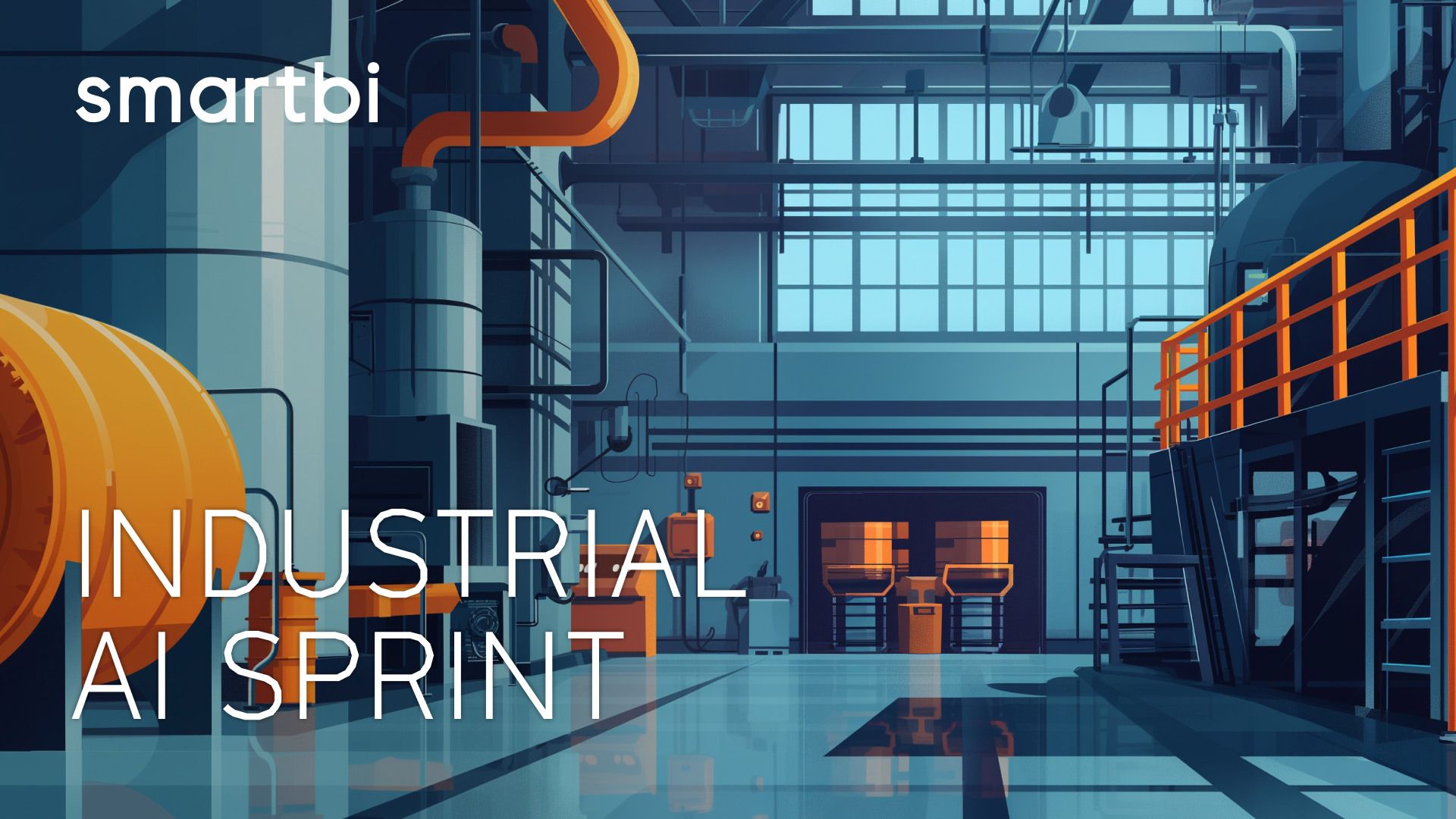
2023 has been marked in history books as the breakthrough year for AI. Previously, this utopian-sounding technology was used only by data experts in large corporations. Now, thanks to consumer-directed tools, it is accessible to everyone. AI-based tools have permanently changed working practices, particularly in industries where even minor savings can significantly impact the business. However, development has lagged in these areas.
Recent research [1] indicates that 56% of industrial manufacturers limit their use of AI to small-scale pilot projects. This approach results in lost savings, production interruptions, and the manufacturing of substandard products.
Solutions tailored for industrial use cases in two weeks
Smartbi's AI Sprint is a two-week program explicitly tailored for industrial companies. During this period, we review the company's data and analytics and your AI ideas to identify the most lucrative ones. The sprint includes interviews, data analysis, and strategic plan development. Ultimately, you will receive an actionable plan that your team can implement immediately.
Why choose the Industrial AI sprint?
- Increasing production efficiency: By automating tasks and improving processes, AI boosts operational efficiency and leads to significantly reduced costs
- Minimizing downtime: Anticipate machine failures and avert production disruptions through proactive measures
- Improving product quality: Detect defections and ensure that only high-quality products and materials are approved
- Creating new business opportunities: AI empowers companies to innovate new products and services, enabling them to expand and grow their business
AI for Industry: What does the future of different industries look like?
Predictive maintenance: Reduce downtime with AI
With AI, maintenance evolves from a reactive to a predictive approach. Algorithms continuously analyse equipment data and data flow, predicting the next maintenance need. Predictive maintenance enables you to:
- Minimise downtime and improve equipment usage rates and lifespan
- Cut costs by avoiding costly repairs (and maintenance specialists) and the subsequent production halts
- Improve production efficiency and fluidity
“86% of surveyed manufacturing executives believe that smart factory solutions will be the primary drivers of competitiveness in the next five years.”
[2] Coykendall et al. (2024).
Supply chain optimization: Streamline operations and reduce costs
Make the supply chain transparent and efficient – anticipate demand and cut inventory costs. Predict demand and reduce inventory expenses. AI can be applied to virtually every stage of the supply chain:
- Forecast demand: Algorithms analyse sales and market trends, accurately predicting future demand. This enables companies to optimise production and inventory management
- Manage inventory: Optimise inventory levels and warehouse locations. This reduces costs and enhances supply chain efficiency
- Optimise routes: Improve routing, transportation planning, and shipment tracking. This adds much-needed transparency to supply chains and, thus, improves final reporting
Did you know that...
- Walmart leverages AI to predict sales and optimise inventories
- Amazon employs AI for route optimization and shipment tracking
- DHL implements technology to automate the customs clearance process
- Samsung deploys AI to check the quality of its semiconductors
- Siemens applies AI to analyse wind turbine production data and predict faults
Quality control and inspection with AI: Ensure high-quality production
AI brings efficiency and speed to quality control and inspection processes without compromising production quality. AI can be used:
- For product inspection: Utilise machine vision to detect product defects instantaneously, including color inconsistencies, cracks, and other irregularities
- For early fault detection: Employ algorithms to analyse equipment wear and identify equipment risks in time. Transition equipment monitoring from reactive to predictive, averting defects
- For optimising production processes: Identify and resolve bottlenecks and boost production workflow efficiency
What value does the Industrial AI sprint offer to your business?
We analyse your company's data in two weeks and explore its AI-related ideas. We develop a precise cost estimate and formulate a strategic action plan, empowering your organisation to make informed, data-driven investment decisions. Your company will get crucial insights into its operations alongside a tactical blueprint designed to improve efficiency and profitability.
Our offering extends beyond technology – we offer a complete, tailor-made integrated solution.
The two-week Industrial AI sprint includes:
Value analysis of development projects
We evaluate the most critical data, analytics, or AI ideas and their business value.
We analyse the expected benefits, such as improved efficiency, reduced costs, and the probability of new revenue opportunities.
Cost estimates of projects
We prepare detailed cost estimates for each project. Cost estimates include personnel costs, equipment purchases, and infrastructure costs.
Prioritised action plan
We help to outline the potential benefits of ideas and development projects via prioritised a benefit-price-complicatedness-roadmap. The action plan includes a schedule and resource plan for implementing each project stage.
Are you ready to explore the impact of AI in your organisation?
Contact usSources:
[1] Broussel et al. (2023). The Future of AI in Manufacturing. Manufacturing leadership council. https://www.manufacturingleadershipcouncil.com/wp-content/uploads/2023/06/The-Future-Of-AI-In-Manufacturing-MLC-2023.pdf
[2] Coykendall et al. (2024). 2024 manufacturing industry outlook. Deloitte. https://www2.deloitte.com/us/en/insights/industry/manufacturing/manufacturing-industry-outlook.html
Could AI be applied to your business case?
Subscribe to the newsletter and learn how AI can solve business challenges.